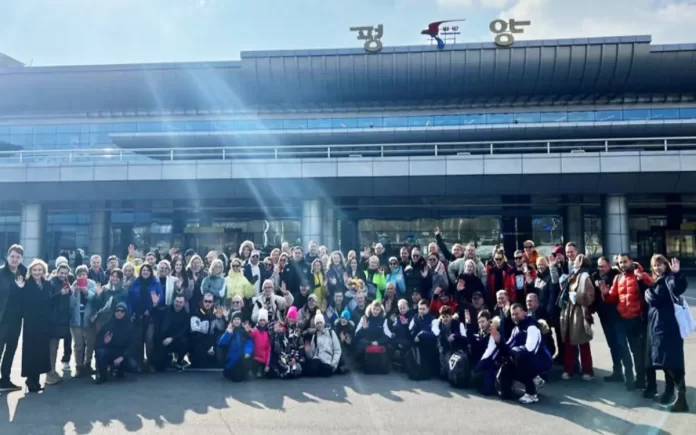Pyongyang: In a groundbreaking development, nearly 100 Russian tourists descended upon Pyongyang International Airport in North Korea, marking the initiation of private skiing expeditions and sightseeing ventures in the reclusive nation following the prolonged hiatus induced by the COVID-19 pandemic.
Tour Details Unveiled
According to reports from Russia’s state-owned TASS news agency, a cohort of 97 travelers, hailing predominantly from Vladivostok in Russia’s far east, embarked on a meticulously arranged group tour to North Korea. Notably, the entourage encompassed budding teenage ski enthusiasts, adding a youthful zest to the excursion.
Facilitated by an Air Koryo flight operated by North Korea, the visitors were ceremoniously transported to Pyongyang, as confirmed by the Russian Embassy’s announcement via a Facebook post on the eventful Friday.
The embassy further divulged the diverse composition of the group, ranging from seasoned professionals in the tourism sector to intrepid adventurers hailing from every nook and cranny of Russia, stretching from Kaliningrad to Vladivostok.
Upon touchdown, the travelers were poised to commence their journey with an initial stopover in Pyongyang before venturing towards the enchanting vistas of the Masikryong Ski Resort nestled in the vicinity of Wonsan, along the picturesque eastern coast of the nation.
Anticipation Amid Diplomatic Endeavors
The rendezvous of Russian tourists in North Korea unfolds against a backdrop of burgeoning diplomatic engagements between Moscow and Pyongyang, promising enhanced synergies in economic and military realms.
This symbiotic trajectory was underscored by the historic rendezvous between North Korea’s Supreme Leader Kim Jong Un and Russian President Vladimir Putin, when Kim embarked on a rare foreign sojourn to the Russian Far East in September of the preceding year. Echoing reciprocal sentiments, North Korean state media recently hinted at Putin’s expressed willingness to reciprocate the visit by gracing Pyongyang with his presence.
Delving into North Korea’s Cautionary Approach The protracted delay in North Korea’s resumption of tourist inflows was attributed to the cautious approach adopted by the regime, rooted in its reluctance to relinquish the stringent control fostered by pandemic-induced restrictions.
Having swiftly sealed its borders in January 2020, North Korea ostensibly became the inaugural nation to enforce a comprehensive lockdown in response to the burgeoning threat of COVID-19. The regime ardently clung to its contention of being impervious to the contagion until May 2022, when it reluctantly confirmed its maiden case, casting doubts on its erstwhile claims of being virus-free.
Compounded by its rudimentary healthcare infrastructure and a dearth of vaccination programs, testing facilities, and therapeutic interventions, North Korea grappled with the formidable challenge posed by the pandemic, exacerbating concerns regarding food scarcity and economic strain.
The Reawakening of North Korea
Following a hiatus spanning nearly four years, North Korea finally unveiled its borders to international traffic in August of the preceding year, gradually easing the stringent constraints that had stifled cross-border movements. Notably, even North Korean nationals had been barred from re-entry during this protracted interlude.
Furthermore, the establishment of “buffer zones” delineating border regions and the resumption of flights connecting Pyongyang with Beijing and Vladivostok underscored North Korea’s calibrated approach to reopening its portals, albeit amid stringent quarantine mandates to curb the incipient spread of the virus.
Amid this gradual transition, international visitors setting foot in North Korea in September of the previous year found themselves subjected to a mandatory two-day quarantine, emblematic of the nation’s meticulous vigilance amidst the resumption of global connectivity.



